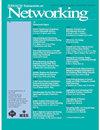Blockchain-Based Reputation Privacy Preserving for Quality-Aware Worker Recruitment Scheme in MCS
IF 3
3区 计算机科学
Q2 COMPUTER SCIENCE, HARDWARE & ARCHITECTURE
引用次数: 0
Abstract
Mobile Crowdsourcing (MCS) has become a novel paradigm for enabling data collection by worker recruitment, and the reputation plays a crucial role in achieving high-quality data. Although identity, data, and bid privacy preserving have been thoroughly investigated with the advance of blockchain technology, existing literature barely focuses on reputation privacy, which prevents malicious workers from submitting false data that could affect truth discovery for data requester. Therefore, we propose a Blockchain-Based Reputation Privacy Preserving for Quality-Aware Worker Recruitment Scheme (BRPP-QWR). First, we design a lightweight privacy preserving scheme for the whole life cycle of the worker’s reputation, which adopts sub-address retrieval technique combined with Pedersen Commitment and Compact Linkable Spontaneous Anonymous Group (CLSAG) signature to enable fast and anonymous verification of the reputation update process. Subsequently, to tackle the unknown worker recruitment problem, we propose a Reputation, Selfishness, and Quality-based Multi-Armed Bandit (RSQ-MAB) learning algorithm to select reliable and high-quality workers. Lastly, we implement a prototype system on Hyperledger Fabric to evaluate the performance of the reputation management scheme. The results indicate that the execution latency for the reputation score verification and retrieval latency can be reduced by an average of 6.30%–56.90% compared with ARMS-MCS. In addition, experimental results on both real and synthetic datasets show that the proposed RSQ-MAB algorithm achieves an increase of at least 20.05% in regard to the data requester’s total revenue and a decrease of at least 48.55% and 3.18% in regret and Multi-round Average Error (MAE), respectively, compared with other benchmark methods.基于区块链的质量意识工人招聘计划的声誉隐私保护
移动众包(MCS)已经成为通过员工招聘收集数据的一种新模式,其声誉在获得高质量数据方面起着至关重要的作用。尽管随着区块链技术的进步,身份、数据和投标隐私保护已经得到了深入的研究,但现有文献几乎没有关注声誉隐私,这可以防止恶意工作者提交可能影响数据请求者发现真相的虚假数据。因此,我们提出了一种基于区块链的质量意识员工招聘计划(BRPP-QWR)的声誉隐私保护。首先,我们设计了一个工作者声誉全生命周期的轻量级隐私保护方案,该方案采用子地址检索技术,结合Pedersen承诺和Compact Linkable Spontaneous Anonymous Group (CLSAG)签名,实现了声誉更新过程的快速匿名验证。随后,为了解决未知工人招聘问题,我们提出了一种基于声誉、自私和质量的多武装强盗(RSQ-MAB)学习算法,以选择可靠、优质的工人。最后,我们在Hyperledger Fabric上实现了一个原型系统来评估声誉管理方案的性能。结果表明,与ARMS-MCS相比,信誉评分验证的执行延迟和检索延迟平均降低了6.30% ~ 56.90%。此外,在真实数据集和合成数据集上的实验结果表明,与其他基准方法相比,所提出的RSQ-MAB算法的数据请求者的总收入至少提高了20.05%,遗憾率和多轮平均误差(MAE)分别降低了48.55%和3.18%。
本文章由计算机程序翻译,如有差异,请以英文原文为准。
求助全文
约1分钟内获得全文
求助全文
来源期刊

IEEE/ACM Transactions on Networking
工程技术-电信学
CiteScore
8.20
自引率
5.40%
发文量
246
审稿时长
4-8 weeks
期刊介绍:
The IEEE/ACM Transactions on Networking’s high-level objective is to publish high-quality, original research results derived from theoretical or experimental exploration of the area of communication/computer networking, covering all sorts of information transport networks over all sorts of physical layer technologies, both wireline (all kinds of guided media: e.g., copper, optical) and wireless (e.g., radio-frequency, acoustic (e.g., underwater), infra-red), or hybrids of these. The journal welcomes applied contributions reporting on novel experiences and experiments with actual systems.
 求助内容:
求助内容: 应助结果提醒方式:
应助结果提醒方式:


